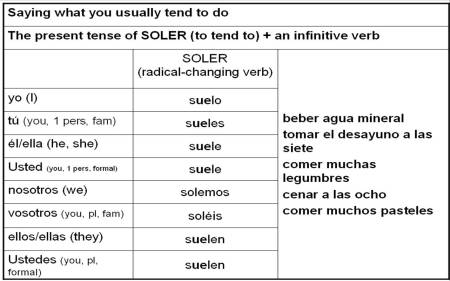Posts Tagged ‘year 8’
December 3, 2010
The assessments next week will cover the topics of:
– describing what people look like
– describing people’s personalities
– comparing people
– sports and hobbies
– future tense and opinions
– food and drink
Use the following links to revise:
www.linguascope.com – beginner – las pasatiempos / los deportes / las frutas / las verduras / desayuno / los snacks
www.languagesonline.org.uk – caminos 1 – unidad 7 (nueva edicion) / unidad 8 / unidad 11 (nueva edicion) / unidad 12 /
Below is your speaking test, make sure that you know answers to the questions off by heart. Go back through your exercise books to help you find the answers. Remember to get level 5 you must use:
– opinions
– accurate verb endings
– future tense
– a variety of vocabulary

Tags:food and drink, homework, sports, writing and speaking exams, y8 spanish, year 8
Posted in adjectives, comparatives and superlatives, food and drink, homework, sports and leisure | 2 Comments »
October 12, 2010
Don’t forget to choose a photo of your own or download one from the web and write a description in Spanish about it (approx. 100 words). Below are some phrases that you might want to use:
Se llama ………. – He / She / It is called ………….
Tiene ……..años – He / She / It is ……………. years old
Es ……..y ……..y tiene el pelo …… y …….. – – He / She / It is …… and ……….. and has ……….. and ………… hair
Es …………. pero muy …………….. – He / She / It is …………… but very ………………
Tiene ……………… – He / She / It has …….(family / pets)
Vive en …………… – He / She / It lives in …………..
Trabaja en ………. – He / She / It works in ……………..
Le gusta …………… – He / She / It likes ……………….
No le gusta ………… – He / She / It doesn’t like …………………
Tags:adjectives, homework, writing, y8 spanish, year 8, year 8. adjectives
Posted in adjectives, homework, writing | Leave a Comment »
November 25, 2009
You can use the verb ‘soler’ instead of saying ‘normalmente’ or ‘generalmente’ – it means that you tend to do something, but remember to include another verb in the infinitive to make a full sentence.

Tags:grammar, soler, spanish, verbs, year 8
Posted in grammar, verbs | Leave a Comment »
September 24, 2009
A comparative adjective is used when we want to compare two things. In English we either add ‘-er’ to the adjective or use ‘more / less ….. than …‘ :
e.g. tall = taller, beautiful = more beautiful
In Spanish the ‘-er’ form does not exist and we only use the ‘more / less …… than …….‘ way of comparing things. Look at the examples below:

Now try to translate the following sentences into Spanish. Click on the thumbnail to check your answers:


Tags:adjectives, comparatives, describing people, spanish, year 8
Posted in adjectives, comparatives and superlatives, grammar, practice exercises, writing | Leave a Comment »
September 9, 2009
Click on the thumbnail below, then read the texts about Marisa, Susana and Laura, then find the following information for each of them:
- La edad (age)
- 2 aficiones (2 hobbies)
- El lugar de vacaciones (holiday location)
- Un rasgo del caracter (a personal characteristic)
- La mascota (the pet)
Once you have done that, translate the 3 sentences underneath the texts into Spanish.

Tags:comparatives and superlatives, homework, reading, spanish, year 8
Posted in comparatives and superlatives, homework, reading | Leave a Comment »





